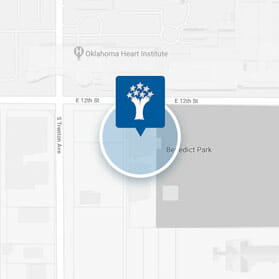History
Parkside was founded in 1959 by Herman P. Taubman and other concerned community leaders with a vision for comprehensive mental health care delivered with excellence and compassion. Upon assurances of federal matching funds, Taubman spearheaded a successful $800,000 fund drive. Initially only outpatient services were offered, beginning in 1961. In 1968 and in response to the needs of the community, a $449,000 construction grant was obtained and another half-million dollar funding campaign was launched enabling Parkside to open its own hospital in 1971. Generous gifts from the estate of James Chapman, and separately from Katharyn Cornell were made to the Tulsa Psychiatric Center. The Cornell-Oglesby Endowment and Chapman Trust assure funding from income to Tulsa Psychiatric Center and Parkside in perpetuity. In 1980, again recognizing community need, a successful $2.5 million dollar campaign funded the construction of the 16 bed Zarrow Transitional Living center (1982) and a two floor expansion of the outpatient building (1983). In 2002, Parkside opened its first residential treatment program for adolescents. In 2004, acute, hospital-based services were made available to adolescents. A 2006 capital campaign funded expansion of Parkside’s residential treatment program for adolescents with construction completed in 2007. In 2008, Parkside expanded its services again by opening a children’s residential treatment program. In 2011, Parkside opened children’s acute hospital services expanding the ages served for inpatient treatment to as young as six. Those services were briefly suspended in 2013 due to a change in interpretation of CMS rules. Parkside has restored that level of care for children in the community. With the generosity of our Parkside staff, board, and surrounding community, Parkside celebrated in 2020 the arrival of our new 114,500 square-foot psychiatric hospital. Our beautiful state-of-the-art hospital allows Parkside to offer 80 single-occupancy patient rooms and expansive treatment areas suitable for social distancing while removing barriers to treatment.
Mission
To provide outstanding mental health and support services
Vision
Parkside will be the psychiatric care provider of choice for patients and professionals.
Values
The values that guide our contributions to the Parkside mission include:
- Integrity
- Teamwork
- Excellence
- Innovation
- Respect and Dignity
- Patient Centered
- Passion
- Resilience
- Community Service
- Customer Service
- Leadership






